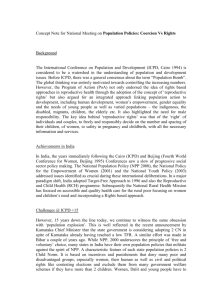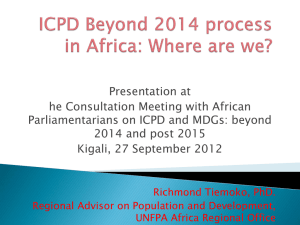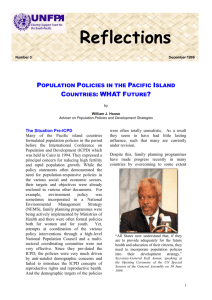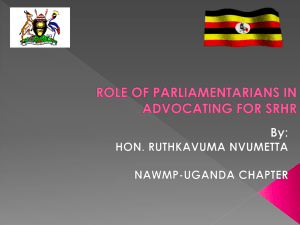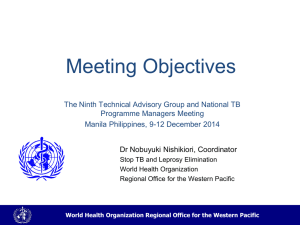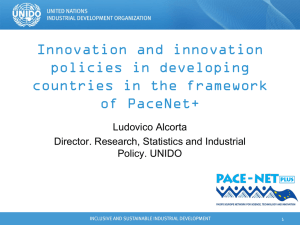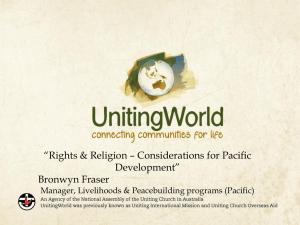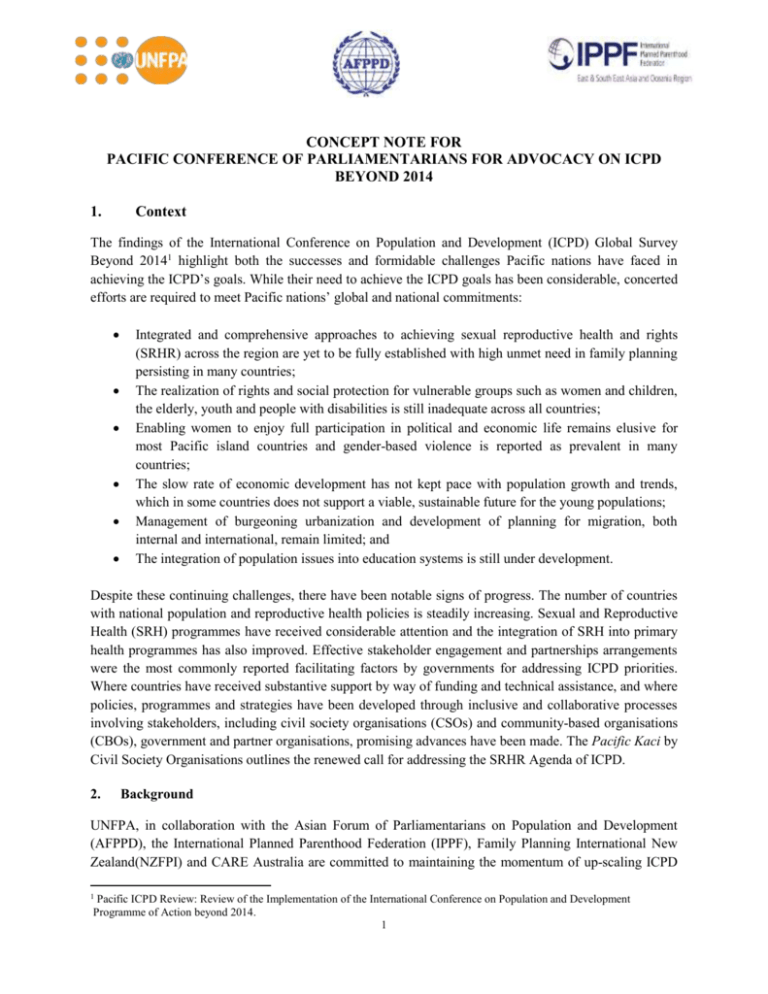
CONCEPT NOTE FOR
PACIFIC CONFERENCE OF PARLIAMENTARIANS FOR ADVOCACY ON ICPD
BEYOND 2014
1.
Context
The findings of the International Conference on Population and Development (ICPD) Global Survey
Beyond 20141 highlight both the successes and formidable challenges Pacific nations have faced in
achieving the ICPD’s goals. While their need to achieve the ICPD goals has been considerable, concerted
efforts are required to meet Pacific nations’ global and national commitments:
Integrated and comprehensive approaches to achieving sexual reproductive health and rights
(SRHR) across the region are yet to be fully established with high unmet need in family planning
persisting in many countries;
The realization of rights and social protection for vulnerable groups such as women and children,
the elderly, youth and people with disabilities is still inadequate across all countries;
Enabling women to enjoy full participation in political and economic life remains elusive for
most Pacific island countries and gender-based violence is reported as prevalent in many
countries;
The slow rate of economic development has not kept pace with population growth and trends,
which in some countries does not support a viable, sustainable future for the young populations;
Management of burgeoning urbanization and development of planning for migration, both
internal and international, remain limited; and
The integration of population issues into education systems is still under development.
Despite these continuing challenges, there have been notable signs of progress. The number of countries
with national population and reproductive health policies is steadily increasing. Sexual and Reproductive
Health (SRH) programmes have received considerable attention and the integration of SRH into primary
health programmes has also improved. Effective stakeholder engagement and partnerships arrangements
were the most commonly reported facilitating factors by governments for addressing ICPD priorities.
Where countries have received substantive support by way of funding and technical assistance, and where
policies, programmes and strategies have been developed through inclusive and collaborative processes
involving stakeholders, including civil society organisations (CSOs) and community-based organisations
(CBOs), government and partner organisations, promising advances have been made. The Pacific Kaci by
Civil Society Organisations outlines the renewed call for addressing the SRHR Agenda of ICPD.
2.
Background
UNFPA, in collaboration with the Asian Forum of Parliamentarians on Population and Development
(AFPPD), the International Planned Parenthood Federation (IPPF), Family Planning International New
Zealand(NZFPI) and CARE Australia are committed to maintaining the momentum of up-scaling ICPD
1
Pacific ICPD Review: Review of the Implementation of the International Conference on Population and Development
Programme of Action beyond 2014.
1
advocacy, awareness and dialogue with and amongst Pacific Parliamentarians and leaders on key ICPD
issues pertinent to the Pacific, such as adolescent sexual reproductive health (ASRH), gender-based
violence (GBV), repositioning family planning and strengthening alliances with faith-based and
community leaders.
Pacific Parliamentarians have engaged in two previous forums bringing together a number of Members of
Parliament (MPs) from across the Pacific region which also included the participation of AFPPD and
NZFPI. In 2011,there was a meeting organized in Fiji with MPs, faith-based leaders and traditional chiefs
with the aim of strengthening this triangular leadership in advocating for ICPD issues, particularly
SRHR and women’s empowerment and gender equality.
In 2012, an Open Hearing and a round table meeting were held in Wellington, New Zealand, with the
partnership of NZFPI and the NZ Parliamentary Group on Population and Development. Parliamentarians
from five Pacific Island countries (Kiribati, Papua New Guinea, Solomon Islands, Tuvalu and Vanuatu)
dialogued on ASRH with young people and practitioners from Pacific Governments and NonGovernmental Organisations (NGOs). Three key recommendations2 emerged from the forum:
i.
ii.
iii.
3.
That a country-specific structure be established in each country which links MPs and SRHR
organizations so that supportive political leaders can advance a SRHR agenda, with a
particular focus on adolescents and youth;
That these structures be actively linked with international and regional networks for technical
support purposes and;
That each country develop their own programme for advancing the SRHR agenda, with each
structure engaging with community leaders as appropriate (e.g. tribal, church, civil society)
and with particular focus on adolescents and youth.
Addressing Unmet Need for Family Planning and Sexual and Reproductive Health
A lack of understanding of the linkages between poverty reduction, reproductive health, and population
has resulted in lower priority and inadequate resource allocation being given to reproductive health,
including family planning, in national development and sectoral plans and programmes. To upscale
programming, political will through advocacy, awareness, dialogue, resource allocation and multi-sectoral
commitment is urgently needed, especially to meet the Millennium Development Goal (MDG) targets of
5a and 5b on reducing maternal mortality and achieving universal access to reproductive health by 2015.
Evidence shows that the unmet need for family planning is high in most Pacific Island Countries,
especially among vulnerable groups and young people. Contraceptive prevalence rates have remained
below 50 per cent and, in some countries, less than 33 per cent, while preventable maternal deaths
continue to occur in some countries. High unintended teenage pregnancy and Sexually-Transmitted
Infections rates in young people reveal a lack of availability and utilization of ASRH services.
Gender inequality and the increasing youth bulge further exacerbate unmet need. An improved legal and
policy framework, protecting rights of vulnerable groups, especially persons with disabilities, and young
people would facilitate increased access to quality SRH services. National GBV prevalence studies reveal
high levels of violence and establish the links between domestic violence and contraceptive use.
Pacific Youth: Their Rights, Our Future. Report of the New Zealand Parliamentarians’ Group on Population and Development,
Open Hearing on Adolescent Sexual and Reproductive Health in the Pacific.
2
2
4.
Objectives
Given the above issues and the current momentum of preparatory meetings leading up to the post-2015
global development agenda, this Pacific Sub-Regional Parliamentarian Conference has the following
objectives:
i.
ii.
iii.
iv.
5.
To brief Pacific MPs on progress achieved towards the ICPD Plan of Action and current
country-identified ICPD issues and gaps, based on the Pacific Regional ICPD Review Report.
To discuss how Pacific Island Countries can effectively contribute to reshaping the ICPD
beyond 2014 and Post-2015 Development Agenda at the regional and global levels through
their strong advocacy and participation to speak with one voice around a few key issues.
To commit to advocate and work in their respective countries, through alliances with
traditional and faith-based leaders, so that SRHR issues are addressed at the political
decision-making levels of governments and capacity is built.
To prepare an ICPD summary information sheet suitable for distribution to all MPs and a
succinct statement for use in their respective Parliaments.
Outcomes
By the end of the meeting, the following outcomes are expected:
i. A reinvigorated platform for national parliamentary advocacy in the Pacific for Population &
Development issues, including SRHR.
ii. A comprehensive plan for Advocacy in ICPD Beyond 2014 in the Post-2015 Agenda and a
clear roadmap for the future advocacy engagement of Pacific MPs.
iii. Strengthened resolve for loud supportive Pacific voices at key regional and global ICPDrelated events for Pacific issues.
6.
Pacific Parliamentary Conference
The 3-day Pacific Parliamentary conference will be held in Suva, Fiji from 13 – 15 August 2013. A
list of Parliamentarians, one from each PIC, is attached as Annex 1. The agenda is attached as
Annex 2. The meeting will have the support of UNFPA PSRO and PNG Country Office, AFPPD,
IPPF SROP, and NZFPI. The UNFPA Pacific Sub-Regional Office will serve as the organizer and
secretariat for the conference.
3

